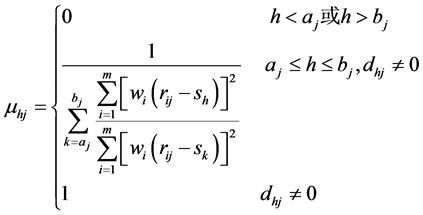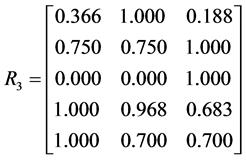1. 引言
随着经济发展,水资源需求量越来越大,供需矛盾突出,本地水满足不了人们正常生活需求,地下水超采等问题相继出现;另外,人们单纯追求经济增长的同时,资源浪费、生态环境恶化等问题严重威胁着人类社会的可持续发展。为了缓解这些矛盾,实现水资源可持续利用,城市水资源开发由之前单一的常规水逐步转向多元化非常规水源利用模式,体现出水资源开发利用措施的多样性。
水资源开发利用措施综合效益评价是一个多目标多层次的过程,影响因素比较多,各影响因素之间关系复杂;并且不同城市和地区由于气候、环境等不同,综合效益影响程度相差也很大 [1] 。王效琴等 [2] 构建了城市水资源开发利用措施综合效益评价体系,用层次分析法对天津市地区进行了评价;金菊良等 [3] 构建了城市防洪规划方案的综合评价模型,以层次分析法作为评价模型的具体建模过程。现有评价模型虽取得了比较好的评价效果,但多数只考虑了定量指标,而对于技术经济、社会效益等难以量化的指标并没有考虑,同时评价模型倾向于采用层次分析法,将多目标问题按单一的评价模型求解 [4] 。基于以上问题,本文以天津市为例,从技术、经济和能源消耗层面出发,引入供水设施运行维护费用和供水满意度两个定性指标,并运用陈守煜教授提出的多层多目标模糊优选理论和模型 [5] ,构建城市水资源综合效益评价体系,并对其做出合理评价。
2. 多层次半结构性模糊优选评价模型
将多层次系统分解成三层,若最低层即第一层(输入层)有N个目标相对优属度输入到第二层,该层有若干个并列的单元系统,且每个单元系统有多个目标相对优属度输入,给每个目标赋予权重,然后对每个单元系统计算输出,即措施相对优属度向量
 (1)
(1)
式中:u为相对优属度向量; 表示第i个单元系统的相对优属度向量,第一层的输出也是第二层的输入;l为评价措施的个数;
表示第i个单元系统的相对优属度向量,第一层的输出也是第二层的输入;l为评价措施的个数; 表示第i个单元系统第l个措施的相对优属度向量。
表示第i个单元系统第l个措施的相对优属度向量。
在式(1)组成第三层中某个单元系统的第i个输入,令
 (2)
(2)
式中:i表示矩阵第i行,共有m行,和指标数目相同;rij表示第i行第j列的相对优属度向量;j表示矩阵第j列,共有n列,和评价措施数相同。
如此从第一层向最高层即(第三层)进行计算,由于第三层只有一个单元系统,因此可得最高层单元系统的输出即为措施相对优属度向量
 (3)
(3)
式中:h为评价等级级别数;u1表示等级1的相对优属度向量。
据此可对各项措施进行优选和综合评价。
3. 水资源开发利用措施综合效益评价计算基本步骤
1) 确定定量指标的相对优属度矩阵 ,根据指标的类型,越大越优型指标用式(4)计算;越小越优型指标用式(5)计算。
,根据指标的类型,越大越优型指标用式(4)计算;越小越优型指标用式(5)计算。
 (4)
(4)
 (5)
(5)
2) 用二元比较法决策思维理论 [6] 来确定定性指标的相对优属度矩阵。
3) 根据重要性排序一致性标度矩阵对指标进行从大到小排序,查模糊语气算子与相对隶属度关系表确定非归一化指标权向量,然后再对其归一化求得指标权向量,同法确定子系统权向量。
4) 利用多级模糊优选理论公式(6)计算第一层各子系统相对优属度向量。
 (6)
(6)
式(6)是其完整形式,本文选用式(7)简化形式进行计算,表示为:
 (7)
(7)
 ;
;
式中:
 (8)
(8)
 (9)
(9)
uhj表示第j个措施对应级别h的相对优属度向量;dhj、zj表示计算参数,wi为第i个指标权重;sh为等级h对应的标准值向量。本文采用优、良、中、可、劣等5级(c = 5)模糊优选模型来进行计算。对任一目标从1级到5级各个级别相对优属度标准值向量取为 。
。
5) 将措施j的m个相对优属度向量逐一与S进行比较,得到措施j的m个目标相对优属度分别介于相邻级别区间的级别上限值bj和级别下限值aj
 (10)
(10)
6) 将第一层亚系统的各子系统相对优属度向量的输出结果当作第二层的输入,计算原理同上述第4)步,便可求得第二层亚系统的相对优属度向量。
7) 最后求出最高层输出相对优属度向量,用式(11)计算各措施的级别特征值。
 (11)
(11)
式中:H表示第j个措施的级别特征值。
4. 实例应用
天津市是一座属于海河流域下游的沿海城市,多年来水资源一直处于匮乏状态,资源型缺水极为严重,当地人均水资源量160 m3/人,占全国平均水资源量的1/15,加上引滦等入境水,人均水资源量也不足370 m3,属于典型的重度资源型缺水地区 [7] 。因此,对水资源的开发采取了污水回用、海水淡化和南水北调等开源措施,从技术经济、生态环境和社会经济三方面对天津市三项水资源利用措施综合效益进行评价比较。选取单位水成本、施工工期、单位水电耗,单位水占地面积、单位水增加的污水中COD含量、年可供水量、供水保障度、单位水移民补偿费、相对水质综合指数和人们可接受程度10项定量指标以及供水设施运行维护费用和供水满意度两项定性指标。本文定量指标数据来源于文献 [1] ,如表1所示。
4.1. 相对优属度矩阵
4.1.1. 定量指标相对优属度矩阵
根据表1中的数据,运用越大越优型或越小越优型公式计算出3个子系统的定量指标的相对优属度矩阵:




Table 1. Comprehensive benefit evaluation system and index data of water resources utilization measures
表1. 水资源利用措施综合效益评价体系及指标数据
4.1.2. 定性指标相对优属度矩阵
首先确定子系统技术经济的定性指标供水设施运行维护费用关于三项措施的相对优属度,污水回用技术在国内外都已达到比较成熟的水平,海水淡化需要经过化学方法的处理,比如蒸馏法和反渗透法等,工序比较麻烦,且耗能大,显然污水回用措施要比海水淡化略为优秀,而利用南水北调措施向天津供水,设备多且复杂,投入费用很大,施工工期长,因此,相比之下污水回用措施要比南水北调措施明显优秀。然后确定供水满意度的相对优属度,对于严重缺乏水资源的天津来说,南水北调每年供水量8.0亿m3,污水回用4.1亿m3,海水淡化最少,为1.5亿m3,所以供水满意度优排序即为南水北调措施最优,比污水回用略为优秀,比海水淡化较为优秀。由文献 [8] 中给定的语气算子与相对隶属度关系表,可查得定性指标的相对优属度矩阵为:

4.2. 指标权向量
4.2.1. 子系统的指标权向量
首先确定子系统1下的3个指标的权重,本文参考文献 [6] 提出互补性思维模式,即 ,
, ,
, 且ekl仅在0,0.5,1中取值,根据重要性排序一致性定理,然后进行一致性检验,得到二元比较重要性排序一致性标度矩阵E。对矩阵E各行求和,并从大到小进行排列,依次为1,2,3。运用文献 [8] 的模糊语气算子与模糊标度、相对隶属度关系表可得子系统1非归一化的相对隶属度权向量为:
且ekl仅在0,0.5,1中取值,根据重要性排序一致性定理,然后进行一致性检验,得到二元比较重要性排序一致性标度矩阵E。对矩阵E各行求和,并从大到小进行排列,依次为1,2,3。运用文献 [8] 的模糊语气算子与模糊标度、相对隶属度关系表可得子系统1非归一化的相对隶属度权向量为:

经归一化处理后的指标权向量为:

同理可得到子系统2、3的指标权向量:


4.2.2. 子系统之间的权向量
考虑到影响技术经济、生态环境和社会经济效益的指标数不同以及三个子系统在水资源开发利用评价中的作用大小,同样查表得非归一化子系统相对隶属度向量为:

归一化后的子系统权向量为:

4.3. 第一层子系统的相对优属度向量
1) 设污水回用为措施1,海水淡化为措施2,南水北调则为措施3。计算3项措施对各级别的相对优属度。以计算技术经济子系统的相对优属度为例,首先确定措施1的a1和b1,将措施1的3项指标相对优属度 逐一与
逐一与 进行比较,得a11 = 3,b11 = 4;a21 = 4,b21 = 5;a31 = 1,b31 = 1;
进行比较,得a11 = 3,b11 = 4;a21 = 4,b21 = 5;a31 = 1,b31 = 1;
根据公式(10)可知
 ,
, ;
;
2) 先由式(8)和(9)计算出 、
、 与zj,再由式(7)计算uhj。(
与zj,再由式(7)计算uhj。( )
)
3) 同理可确定措施2和措施3的各级相对优属度。将计算出的子系统技术经济措施1对5个级别的相对优属度向量列入表2。
4) 计算子系统技术经济效益的各措施级别特征值。由式(9)计算出子系统技术经济3项措施的级别特征值 ,由于H等于1级和2级所对应的相对优属度标准值分别为1和0.8,按线性内插求得子系统技术经济的措施相对优属度向量:
,由于H等于1级和2级所对应的相对优属度标准值分别为1和0.8,按线性内插求得子系统技术经济的措施相对优属度向量:

对第一层子系统2、3同子系统技术经济的计算过程,得到生态环境效益和社会经济效益措施的相对优属度向量分别为:


4.4. 第二层各措施相对优属度向量
根据多层多目标模糊优选原理,第一层子系统的输出就是第二层亚系统的输入,第一层3个子系统3项措施相对优属度向量所组成的优属度矩阵为:

Table 2. The relative optimal membership degree vector of 5 levels of technology and economy in 3 levels
表2. 技术经济3项对5个级别的相对优隶属度向量

Table 3. Second layer 3 measures on the 5 levels of relative membership degree vector
表3. 第二层3项措施对5个级别的相对优属度向量

上面已确定了各子系统的权重 。按照上述原理步骤,同样计算第二层3项措施对5个级别的相对优属度向量,结果见表3。
。按照上述原理步骤,同样计算第二层3项措施对5个级别的相对优属度向量,结果见表3。
4.5. 输出层相对优属度向量
应用式(11)级别特征值公式计算得 ,由于H为1、2、3级所对应的相对优属度标准值分别为
,由于H为1、2、3级所对应的相对优属度标准值分别为 ,按线性内插得到各方案输出层的相对优属度向量:
,按线性内插得到各方案输出层的相对优属度向量:

根据相对优属度最大或级别特征值最小的优选原则,可知,天津市水资源开发利用措施综合效益评价措施1为最满意,即污水回用措施带来的综合效益为最优,海水淡化综合效益最差。因此,三项措施综合效益从大到小排序为:污水回用 > 南水北调 > 海水淡化,与层次分析法评价排序结果一致 [2] 。污水回用综合效益之所以最好,是因为它的投资、成本要远小于后两者,从循环经济理念考虑,污水回用不仅能减少城市排污量,且能实现水资源的可持续利用 [9] 。由于考虑到海水淡化的高能耗,高污染问题,以及南水北调每年为天津市提供的水量远大于海水淡化,因此南水北调所带来的综合效益要高于海水淡化措施。
5. 结语
本文采用多层次半结构性模糊优选法构建了城市水资源开发利用措施综合效益评价模型,选取10个代表性定量指标、2个定性指标建立三层评价体系,定性指标的纳入使得评价体系更加完善。分析三项开源措施所带来的综合效益,其中以污水回用措施最优,评价结果符合天津市水资源开发利用的实际情况。与层次分析法相比,多层模糊优选法不仅可以进行各种措施的评价,也可以用于不同措施的优选,此法计算过程简便,结果合理,可为天津市水资源开发利用提供决策和理论支持。
基金项目
国家自然科学基金项目(51509088);水利部公益性行业科研专项(201501008),水资源高效利用与保障工程河南省协同创新中心(2013CICWP-HN)。